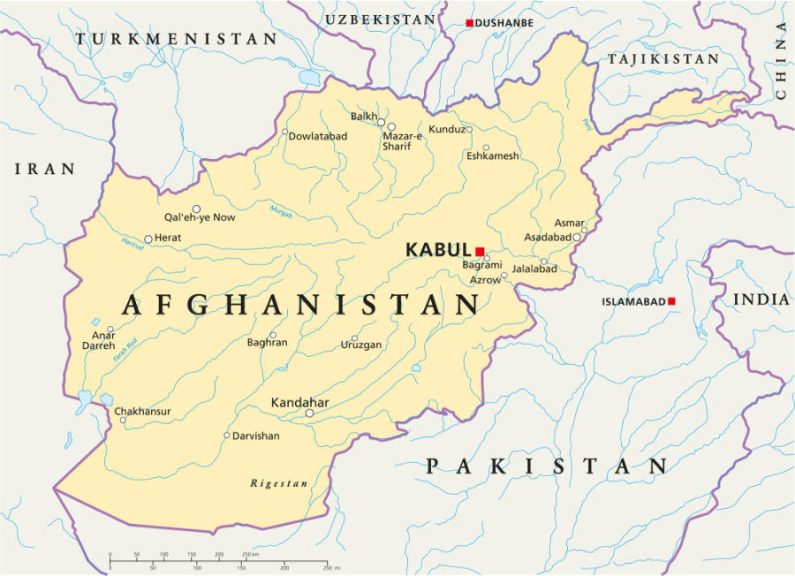The “Regional Quadripartite” – Russia, China, Iran, and Pakistan – has held its fourth meeting to address Afghanistan security and related affairs. The meeting was attended by Russian Foreign Minister Sergey Lavrov, Iranian Foreign Minister Seyed Abbas Araghchi, Yue Xiaoyong, the Chinese envoy on Afghanistan, and Umer Siddique, a senior Pakistani diplomat.
The participants reviewed the current situation in Afghanistan and underscored their aspiration for the country to emerge as an independent, peaceful state – free from terrorism, war, and drugs. They emphasised the pressing need for enhanced constructive and pragmatic engagement by the international community with Kabul to develop the Afghan sovereignty and reinforce regional and global stability.
However, they expressed serious concerns over the growing security threats in Afghanistan, particularly the continued presence of terrorist groups operating from Afghanistan and emphasised the urgent need for regional cooperation to address rising instability. They specifically highlighted a resurgence of activity by terrorist groups such as ISIL, Al-Qaeda, Tehrik-i-Taliban Pakistan, and the Eastern Turkestan Islamic Movement. These groups, the ministers asserted, represent a serious threat not just to Afghanistan but to global security as well.
They also firmly rejected the idea of re-establishing US military bases in and around Afghanistan, following US President Donald Trump’s statements last week to return the Bagram Air Base to the Pentagon. This was also rejected by the Taliban. Bagram is southeast of Charikar in Afghanistan’s Parwan Province. It is currently administered by the Afghan Ministry of Defense.
The four ministers stated that NATO members bear primary responsibility for Afghanistan’s current situation. They demanded the lifting of unilateral sanctions against Afghanistan, and the return of frozen Afghan assets to assist the Taliban government finance its domestic security and development. “NATO members should create opportunities for Afghanistan’s economic recovery and development” they said, advocating for a holistic approach to the nation’s reconstruction.

They also had strong words for the Taliban, currently in power in Afghanistan and its effective government, urging them to fulfil their international obligations by dismantling and eliminating terrorist groups. They said “We call on the Afghan authorities to take effective, concrete, and verifiable actions to combat terrorism, including preventing recruitment, fundraising, and access to weapons, and dismantling terrorist training camps on Afghan soil.”
In addition to security, the four sides discussed Afghanistan’s economic recovery, with a particular focus on combating the rise of synthetic drugs and facilitating the return of Afghan refugees. The ministers expressed support for measures aimed at reducing the cultivation of opium and combating narcotics trafficking.
They also urged greater international support for Afghanistan, especially in terms of humanitarian assistance, saying “We call on the international community to intensify emergency humanitarian aid for the Afghan people” stressing the need to provide support without political conditions attached.
The four countries reiterated the importance of an inclusive governance system in Afghanistan that reflects the needs of all ethnic and religious groups, with a particular focus on ensuring women’s rights to education, employment, and participation in public life, saying “Women’s access to education, economic opportunities, and basic services is essential for the stability and prosperity of Afghanistan.”
The foreign ministers also called for enhanced counter-terrorism cooperation at both bilateral and multilateral levels. They emphasised that Afghanistan should be supported in taking comprehensive measures to fight terrorism and prevent the use of its territory against its neighbours and beyond.
“The sovereignty, independence, and territorial integrity of Afghanistan must be respected,” the statement concluded, opposing the reestablishment of military bases in and around the country.
The meeting was a significant step toward strengthening regional cooperation on Afghanistan, with the ministers acknowledging the ongoing efforts of regional countries, particularly Pakistan and Iran, in hosting millions of Afghan refugees. The four sides expressed their commitment to continued collaboration to help Afghanistan recover from decades of conflict and instability.
In closing, the ministers expressed their support for diplomatic efforts aimed at resolving Afghanistan’s political issues. “We emphasise the role of regional frameworks such as the Moscow Format and the Shanghai Cooperation Organization in facilitating a political settlement,” the statement said, welcoming recent discussions in Dushanbe, Tajikistan, and encouraging the continuation of quadrilateral consultations on Afghanistan’s future.
The full Quadripartite statement can be read here
Summary
The Quadripartite countries have their own serious concerns about Afghanistan, with Pakistan a neighbouring country with its own terrorism and security issues and in possession of nuclear weapons. China, while more stable, also has concerns about the potential for Islamic unrest in its western Xinjiang Province. Iran possesses millions of Afghan refugees it would prefer to see returned; and is also subject to security stresses on its own borders. Russia meanwhile acts in coordination with Afghanistan’s other neighbours – and especially Tajikistan, Turkmenistan and Uzbekistan. It has considerable experience with Afghanistan’s issues.
However, it appears that they are dissatisfied with a lack of assistance in helping Afghanistan improve its security. They regard many of Afghanistan’s problems a direct result of the United States invasion and occupation of the country, with NATO also involved. Neither, since the US withdrawal in 2021, have been assisting with Afghanistan’s reconstruction and redevelopment. China, Russia, Iran and Pakistan are essentially providing signals to the West that if they do not turn their attention towards assisting Afghanistan – new problems and terrorist activities may re-emerge, again targeting Western assets. It is a sobering image.
Further Reading
Afghanistan Turns To Russia For Investment Into Its Hydrocarbon Industry

 Русский
Русский













